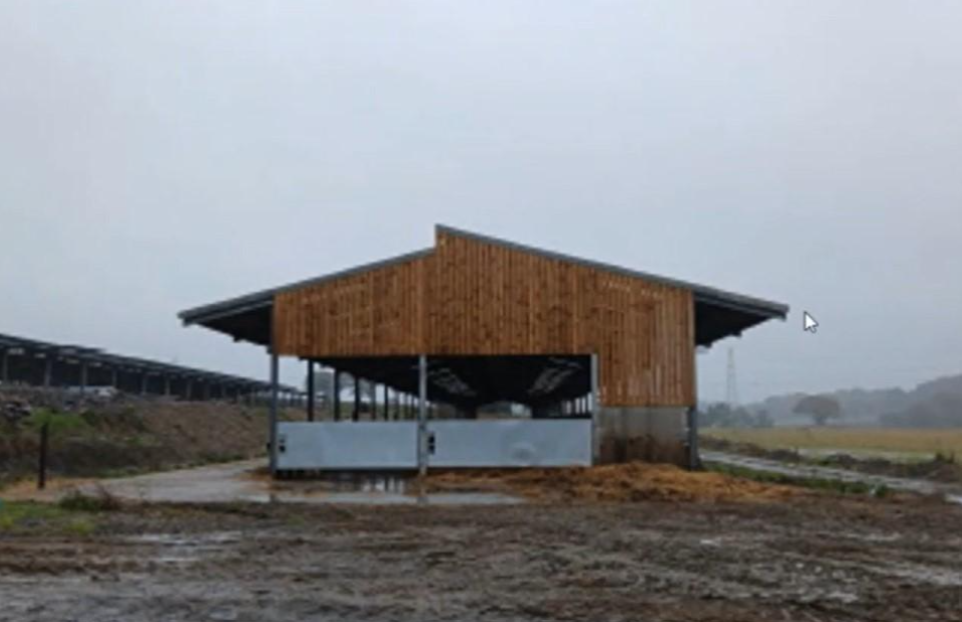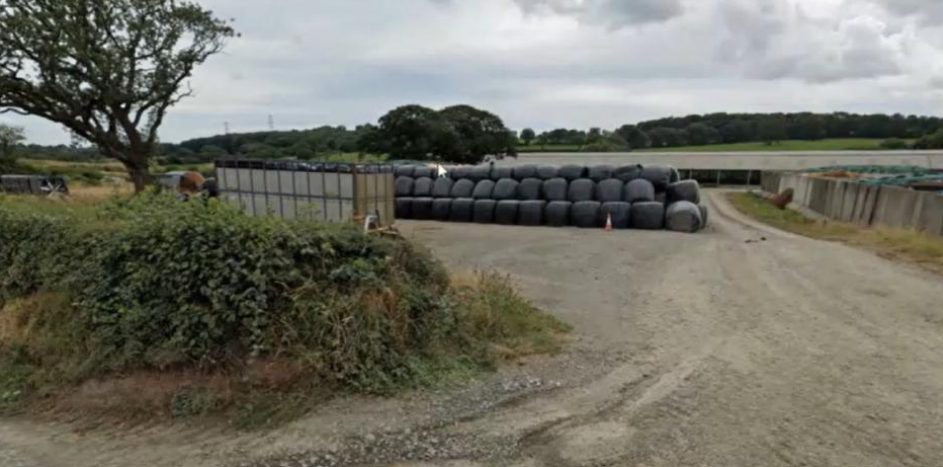Farming
Farming Connect review welcomed


NFU Cymru President Stephen
James: “We look forward to
working with Government on the
development of this strategy.”
THE REPORT, launched at the Winter Fair, considers the proposed approach to delivering knowledge transfer, advice and innovation under the next Rural Development Programme (RDP) and makes a total of 24 recommendations. NFU Cymru President Stephen James said: “We are pleased that the Deputy Minister for Farming and Food, Rebecca Evans, has this morning announced that she is accepting all 24 of Gareth Williams’ recommendations and that Welsh Government officials have drawn up an action plan to ensure effective and timely implementation working closely with industry stakeholders.”
Key recommendations include retaining the current levels of intervention at 100% for the knowledge transfer programme and 80% for the subsidised services including Whole Farm Plan, Farm Advisory Service and the Skills Development Programme. NFU Cymru believes that this will be crucial in securing high levels of uptake and engagement from farmers.
The mandatory training requirement for providers of Farming Connect services will be a key contributor in driving higher standards in knowledge transfer and advice provision going forward. Stephen James continued: “We are very pleased that Gareth Williams has acknowledged wider RDP funding and projects within his report. We have been concerned that, under the current RDP, there have been too many projects with competing/duplicating roles and it is clear that there needs to be far better integration and join-up in the next RDP.
The recommendation for the establishment of a RDP Project Advisory Committee consisting of both Government and industry representatives is, therefore, significant and NFU Cymru believes that this decision making body will be crucial in ensuring the Rural Development Programme delivers greater impact and benefit to the farm level.
“We are pleased that Mr Williams recognises the need for a clearer focus and direction for the farming industry through a Welsh Agricultural Strategy and the policies supporting Rural Development. We look forward to working with Government on the development of this strategy which should show how agriculture can deliver the outcomes of the Food Action Plan which aims to grow output for the sector by 30% to £7b by 2020.”
Mr James concluded: “Overall, we welcome the review which has put forward a number of useful recommendations not only for Farming Connect but for the wider RDP. NFU Cymru continues to work tirelessly to ensure the RDP delivers direct benefit for farmers and we look forward to working with Welsh Government to see the recommendations of the report are fully and swiftly implemented.”
The decision of the Welsh Government to accept the report’s recommendations has also been welcomed by the FUW. The union’s land use and parliamentary committee chairman Gavin Williams said: “Having contributed to the review we are extremely pleased that many of our ideas are reflected in the report. Ensuring closer relationships between industry and Welsh Government to deliver the RDP programme is welcomed, as is a greater emphasis on encouraging farmers to undertake their own business planning and longer term decision making. “We also welcome the greater flexibility within the programme which will allow it to adapt to changing industry needs and the retention of the current intervention rates for knowledge transfer, One-to-One advice and training will help drive the industry forward. We look forward to working with Welsh Government to ensure that the next Farming Connect programme fully reflects industry needs.”
Farming
Performance recording transforms hill flock at Llysfasi college farm

A WELSH college farm is successfully lambing triplet-bearing ewes outdoors on exposed hill ground after introducing genetic performance recording to strengthen maternal traits and flock resilience.
At Coleg Cambria Llysfasi, near Ruthin, a flock of 120 pure Welsh Mountain ewes grazes land rising between 1,000 and 1,300 feet above sea level, where winter conditions can be harsh and only the hardiest sheep thrive.
Since joining the Farming Connect Welsh Sheep Genetics Programme in 2023, the farm has used Estimated Breeding Values (EBVs) to target improvements in maternal ability, growth rates and overall performance. Although genetic gains are often gradual, staff say results are already clear just three years into the scheme.
Historically, ewes carrying triplets were lambed indoors, adding labour and cost. Now, improved maternal strength means they can lamb outside with minimal intervention.

“The ewes are holding their body condition better, we haven’t had any problems lambing them outdoors and they keep their lambs very well,” said shepherd Alun Jones. “We’re seeing fewer losses and far less hands-on work. In the 2025 season we only assisted two ewes out of 120.”
The wider system runs 600 ewes, including Welsh Mountains crossed with Abertex to produce mule ewe lambs, and mules crossed with Beltex or Texel rams for finishing lamb production. Plans to phase out the Welsh Mountain breed were reversed after recognising its value for hardiness and mothering ability in upland conditions.
Performance recording began in autumn 2023 with tissue samples, body condition scoring and regular weighing to create a reliable data baseline.
“Before, we were judging by eye,” said Mr Jones. “Now we’ve got hard evidence to guide decisions.”
By identifying and removing the bottom 20 per cent of performers, the flock’s overall index has risen from £13 to £16.24 — a significant lift in commercial potential.
Lambs are currently creep-fed and sold from November to January at 38–42kg liveweight, with a longer-term aim to finish earlier and reduce concentrate use.
Farm manager Dewi Jones said the data has also changed how they buy rams.
“When you’re at a sale and you’ve got the indexes in front of you, you can draw a red line through the animals that don’t stack up. Type still matters, but figures matter just as much. Data gives you confidence in your choices.”
Some home-bred ram lambs are now matching the performance of sale-topping sires, creating opportunities to retain or market their own breeding stock.
Mr Jones believes the sheep sector could benefit from taking a more data-driven approach, similar to dairying.
“If we don’t measure, we can’t improve. Recording takes time, but the rewards are there. It’s about working smarter and building a more resilient flock for the future.”
Shepherd Alun Jones with Welsh Mountain ewes at Llysfasi.
Performance recording and weighing form a key part of the improvement programme.
Business
Langdon Mill Farm Pembrokeshire expansion signed off

THE FINAL sign-off for plans for a heifer accommodation building and associated works at one of Pembrokeshire’s largest dairy farms, with a milking herd of 2,000 cows, have been given the go-ahead.
In an application backed by councillors at the December meeting of Pembrokeshire County Council’s planning committee, Hugh James of Langdon Mill Farms Ltd sought permission for a 160-metre-long heifer accommodation building, a slurry separation/dewatering building and associated yard areas at 1,215-hectare Langdon Mill Farm, near Jeffreyston, Kilgetty.
A supporting statement through agent Reading Agricultural Consultants said: “The holding currently has a milking herd of approximately 2,000 cows, which are housed indoors for the majority of the year, with dry cows and heifers grazed outdoors when weather and soil conditions permit.

“There has been significant investment in buildings and infrastructure at the farm over the last decade in respect of cattle accommodation, slurry storage, milking facilities, Anaerobic Digestion (AD) plant, feed storage. Recently a calf and weaned calf accommodation buildings were approved by Pembrokeshire County Council with construction almost complete.
“The unit is efficient, achieving yields of more than 10,000 litres/cow/year, with cows being milked three times/day in the 60-point rotary parlour. Langdon Mill Farm currently directly employs 21 full-time, and three part-time staff. Of these, four live on site in the two dwellings opposite the farm, with the remaining staff living in the locality.”
It added: “Although the unit has previously purchased heifers to aid expansion, the farm now breeds most of its own replacements to improve genetics and to minimise the ongoing threat of bovine tuberculosis (bTB).”
It said the proposed building would be used by heifers between the ages of 7-22 months, the siting “directly influenced by the adjacent calf and weaned calf buildings, with livestock being moved from one building to the next as they get older”.
Members unanimously supported the recommendation of approval, giving delegated powers to the interim head of planning to approve the application following the final approval of a habitats regulations assessment.
An officer report published yesterday, February 5, said Natural Resources Wales confirmed it had received the assessment, and, “in consideration of the mitigation measures detailed and on the understanding there is no increase in stock, they agree with the LPA’s conclusion that an adverse effect upon the integrity of the SAC [Special Areas of Conservation] sites can be ruled out”.
Formal delegated approval has now been granted by officers.
Farming
Forgotten meats tipped as future ‘superfood’ comeback

SO-CALLED “forgotten meats” such as liver, heart and kidneys could soon find their way back onto dinner plates, with scientists suggesting they may offer a cheap, sustainable and highly nutritious alternative to modern ultra-processed foods.
Offal was once a staple of everyday diets across the UK, particularly in working-class households, but has steadily fallen out of favour in recent decades despite being rich in iron, protein and essential vitamins.
Now researchers at Aberystwyth University are working with Hybu Cig Cymru (HCC) to understand why demand has dropped and whether these cuts could be repositioned as affordable “superfoods”.
Scientists say that when nutrient-dense parts of the animal go uneaten, valuable food is effectively wasted.
Dr Siân Mackintosh, from the university’s Institute of Biological, Environmental and Rural Sciences (IBERS), said these meats could play an important role in healthier and more sustainable diets.
“Where they are not being used, these nutrient-dense ‘forgotten meats’ represent a significant loss of nutrients from our food chain,” she said. “Incorporating them as part of a balanced diet could support human health while also reducing food waste and improving environmental outcomes.”
Taste tests win over public
To test public attitudes, HCC staff have been running tasting sessions at major agricultural events including the Royal Welsh Show and the Winter Fair in Llanelwedd.
Visitors sampled dishes made with Welsh lamb’s liver, including stroganoff, traditional faggots and pâté. Organisers say many people were surprised by the flavour and keen to learn how to cook them at home.
Dr Eleri Thomas, Future Policy and Project Development Executive at HCC, said interest was stronger than expected.
“We believe there is significant potential for these forgotten meats to be incorporated back into our diets,” she said. “Consumers liked the flavour and wanted recipes and cooking tips, as well as understanding the nutritional value.”
She added that making better use of undervalued cuts could improve sustainability across the meat supply chain while creating new marketing opportunities for Welsh producers.
Part of wider sustainability project
The work forms part of the SMART Nutrient Cymru project, funded through the Welsh Government’s innovation support scheme.
Project lead Dr Christina Marley said the aim is to capture nutrients currently being lost across the agri-food system.
Alongside the collaboration with HCC, the team has also partnered with Dŵr Cymru Welsh Water on land management to protect rivers, and with British Wool to explore new uses for fleece by-products.
IBERS itself is one of eight UK research institutes strategically supported by Biotechnology and Biological Sciences Research Council, providing national expertise in grassland and plant breeding science.
Researchers say that with food prices rising and pressure growing to reduce waste, traditional nose-to-tail eating could offer both economic and environmental benefits.
Image: Welsh lamb faggots (Pic: HCC)
-

 Health6 days ago
Health6 days agoHealth board targets rise in steroid and gym drug use across west Wales
-

 Crime7 days ago
Crime7 days agoSex offender jailed after living off grid in Pembrokeshire and refusing to register
-

 Crime6 days ago
Crime6 days agoTeacher injured and teenager arrested for attempted murder at Milford Haven School
-

 Business2 days ago
Business2 days agoComputer Solutions Wales under fire from customers
-

 Business5 days ago
Business5 days agoSix-figure negligence victory leaves retired builder trapped in divorce limbo
-

 News6 days ago
News6 days agoReform appoints Dan Thomas to lead party in Wales
-

 News6 days ago
News6 days agoAnother Senedd member defects to Reform as Lib Dem MP hits out
-

 Sport6 days ago
Sport6 days agoWales name squad for Six Nations opener against England




























